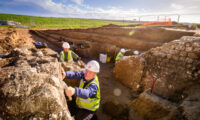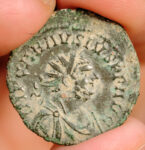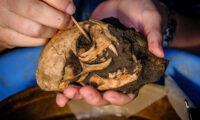 An excavation of the Roman amphitheater in Richborough, Kent, has revealed the remains of a carcer, the cell used to hold gladiators, criminals and animals off-stage before they entered the arena. It has also unearthed traces of polychrome paint on the arena wall, the first example of painted plaster ever discovered on a Roman amphitheater in Britain, and the complete skeleton of a pet cat.
An excavation of the Roman amphitheater in Richborough, Kent, has revealed the remains of a carcer, the cell used to hold gladiators, criminals and animals off-stage before they entered the arena. It has also unearthed traces of polychrome paint on the arena wall, the first example of painted plaster ever discovered on a Roman amphitheater in Britain, and the complete skeleton of a pet cat.
Today Richborough is in marshy land two miles inland, but when it was founded as the military fort of Rutupiae, it was on the Wanstum sea channel that separated Kent from the Isle of Thanet. The first legions under Aulus Plautius landed there 43 A.D., spearheading the Roman invasion of Britain. The landing base expanded into a supply base and then into a massive fort with an associated civilian settlement and a bustling port with a sheltered harbor at the easiest crossing point from Gaul.
 The first defensive earthworks, v-shaped ditches more than 700 yards long, dug by the legionaries are still visible at the Richborough Roman Fort site today. The stone walls of the 3rd century fort also survive. The town’s public structures include the amphitheater and an enormous monumental victory arch built in around 85 A.D. to commemorate the Claudian conquest of Britain. Today only the base of the arch survives, but we know from the remains that it was a quadrifons (four-sided) arch more than 80 feet high, clad in white Italian marble decorated with sculptural reliefs and inscriptions.
The first defensive earthworks, v-shaped ditches more than 700 yards long, dug by the legionaries are still visible at the Richborough Roman Fort site today. The stone walls of the 3rd century fort also survive. The town’s public structures include the amphitheater and an enormous monumental victory arch built in around 85 A.D. to commemorate the Claudian conquest of Britain. Today only the base of the arch survives, but we know from the remains that it was a quadrifons (four-sided) arch more than 80 feet high, clad in white Italian marble decorated with sculptural reliefs and inscriptions.
The amphitheater was likely built when Rutupiae was at its peak in size, population and influence in the 2nd century. Its remains are largely underground and it looks like a mound on the site today. Before now, it was excavated only once in 1849, which is antediluvian as far as archaeological methodologies are concerned. Geophysical surveys have mapped its perimeter and found it more than 200 feet long and 165 feet wide, large enough to seat an audience of 5,000. After a Covid delay, excavation of the amphitheater site began this year for the first time since the Victorian era.
In the past few weeks, excavators have discovered details of how the amphitheatre was constructed. The exterior wall was up to six metres thick and made of stacked turf, and the interior wall around the arena was made of locally quarried chalk blocks.
“Really significantly, we’ve discovered that they rendered the inside of the wall that was facing into the arena, and then plastered it. And there are traces of paint on the arena wall,” said Pattison.
“We are beginning to think there was a series of painted rectangular panels, because there are vertical and horizontal lines in red, yellow, black and blue. They probably originally contained painted scenes, perhaps figurative scenes of what happens in amphitheatres.
“We don’t have that detail yet, but we have the paint and that’s a really good start. Given that we’ve only excavated a tiny fragment of the wall, it bodes well for better-preserved painted scenes elsewhere around the circuit. So we’re pretty excited.”
None of the other 15 or 16 amphitheatres discovered in Britain had this treatment, Pattison said. “This is a very rare find in Britain. There may be about 19 or 20 in the whole Roman empire.”
 The recent dig also discovered the skeletal remains of a cat, dubbed Maxipus by the punny archaeological team, that was purposefully buried with care just outside the amphitheater in a domestic area of the Roman settlement. Artifacts unearthed in the dig include coins, jewelry and pottery. These finds are evidence that Roman Richborough was continuously inhabited from the time the first legions stepped their hobnailed feet on the island until the last days of Roman rule in Britain in 410 A.D.
The recent dig also discovered the skeletal remains of a cat, dubbed Maxipus by the punny archaeological team, that was purposefully buried with care just outside the amphitheater in a domestic area of the Roman settlement. Artifacts unearthed in the dig include coins, jewelry and pottery. These finds are evidence that Roman Richborough was continuously inhabited from the time the first legions stepped their hobnailed feet on the island until the last days of Roman rule in Britain in 410 A.D.
I would expect that the carcer’s name would be what has led to the modern verb “incarcerate”. Love finding word origins like that!